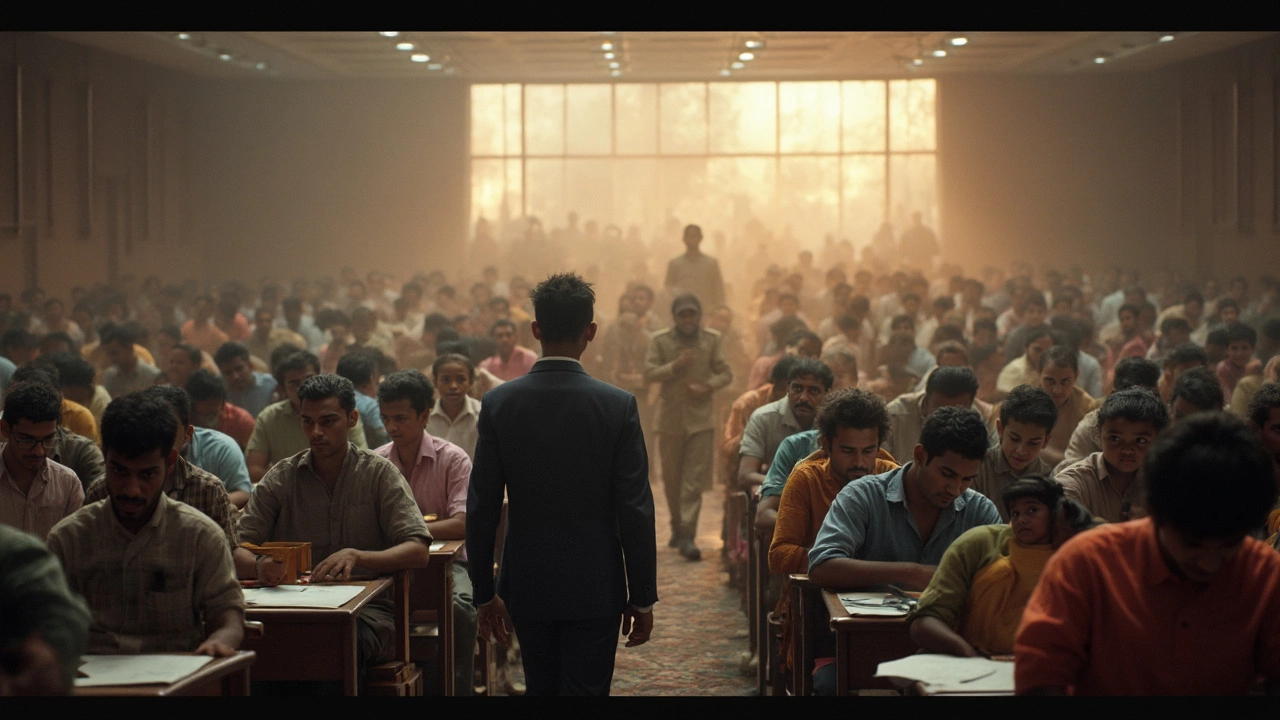
When you think of tough jobs, something like a government gig might not be the first thing that pops into your head—but hold up. Some government jobs are kind of like climbing Everest. They are not just about punching a clock and cashing a paycheck. Instead, we're talking about roles that demand a crazy level of dedication, mental agility, and skills you probably didn't even know were essential.
Take the Indian Administrative Service (IAS), for example. This isn't just about prestige; it's about having your game face on 24/7. You have to make decisions that impact millions of lives, and getting there isn’t a walk in the park. The coveted spot means acing one of the toughest exams on the planet, with a pass rate so low you’d think it’s a lottery.
So, why would someone go for these Hercible roles? There's more than just a fancy badge involved. For plenty, it's about making a real difference in the world, while also getting the perks that come with a high-profile job. Stay tuned as we unravel the complexity of the most challenging jobs out there and how you might be able to face them head-on.
- The Definition of 'Difficult'
- Top Contenders: The Toughest Government Jobs
- Why These Roles Are So Demanding
- Skill Set Required for Success
- Tips to Tackle Tough Government Exams
- Stories from Those Who Made It
The Definition of 'Difficult'
Alright, so what makes a difficult government job really, well, difficult? It's definitely not about just clocking in from 9-to-5 and calling it a day. Let's break it down. When we say difficult, we're talking about a mix of intense competition, simply brutal exams, and mind-bending responsibilities.
First up, competition. Many government jobs are basically magnets for people looking for stable and rewarding careers. That means you're not just competing with a bunch of random folks but some seriously brainy ones. For instance, exams like the UPSC in India have more aspirants than you’d find grains of sand on a beach. In 2024, almost a million people applied for the IAS prelims, but only 0.1% made it to the final cut.
Then there's the preparation process. Think of it like training for the Olympics, but without the gold medal at the end. It's demanding, requires months or even years of study, and you must know public policies like the back of your hand. These exams test everything from your general knowledge to your analytical skills, requiring a versatile skill set.
Now, let's talk about the workload. Getting the job is only part of it. You've got to tackle responsibilities that can sometimes seem overwhelming. Imagine being responsible for social welfare programs, natural disaster management, or even national security policies. Yeah, no pressure at all!
So, when we call a government job difficult, it's about the double whammy of getting in and staying sharp throughout your career. It’s a path not for the faint-hearted, but for those who want to make a real impact.
Top Contenders: The Toughest Government Jobs
Diving into the world of toughest government jobs, it's like piecing together a puzzle of mental endurance, strategic planning, and sharp acumen. At the top of the list, we have the Indian Administrative Service (IAS). Hailed as one of the most elite roles, getting into the IAS has aspirants juggling the UPSC exam, which throws questions that seem like Sherlock-worthy puzzles. It's not just knowledge; it's also about sustained focus and critical thinking.
Next on the list is the United States Foreign Service Officer. These officers are our diplomatic knights, tasked with preserving peace and solving tricky international issues. Michelle Gavin, a seasoned Foreign Service Officer, once said,
"It's not just your typical 9-to-5 job. It's a marathon where every mile counts."This role often includes periods away from home amidst challenging environments, demanding both patience and resilience.
Another runner-up is Japan's National Tax Agency (NTA) Examiner. Yeah, it sounds dry but imagine managing taxes in a country where precision is everything. The entry exam is notorious for its intensity, with only a fraction of applicants making it to the finish line.
Here's a quick view of how grueling some of these jobs can be:
| Job | Selection Rate | Average Preparation Time |
|---|---|---|
| IAS | Less than 1% | 1-2 years |
| U.S. Foreign Service Officer | Approx. 3% | Varies (depends on assignments) |
| NTA Examiner | About 2% | 1-2 years |
These roles are not for the faint-hearted but still lure thousands who are passionate about making a difference and embracing the challenge. So, if you're thinking about jumping into this deep end, know what you're signing up for—it's a wild ride, but one with a lot of potential rewards.
Why These Roles Are So Demanding
Ever wonder what makes some government jobs more challenging than running a marathon? It's not just the heavy workload; there's a lot more to it. The first hurdle is usually the crazy competitive selection process. Imagine facing an exam with a success rate of less than 1%, like the Civil Services Examination for IAS officers. Talk about pressure!
Then, there’s the constant juggling act required. These positions demand a mix of skills—from managing crises to crafting policies that affect millions. Decision-making isn’t just about ticking some boxes; it requires analytical skills, quick thinking, and an ability to foresee the impact of every move. Think of it like chess, but each piece can affect real lives.
Let’s not forget about the bureaucratic maze. Navigating through tons of regulations and red tape can test anyone’s patience. These roles often come with political intricacies that one needs to manage, making them highly demanding and, frankly, worth a good challenge if you ask some folks.
Also, responsibilities are sky-high. Holders of these roles often need to act swiftly during emergencies, where the stakes are sky-high. There are moments when they’re the ones called upon during natural disasters or security threats. Can you imagine the layers of stress involved?
On top of everything, there’s public accountability. Every decision is under scrutiny—thanks, social media! You're a public figure, expected to uphold integrity and transparency at all times.
The combination of all these factors—rigorous exams, diverse skill requirements, endless paperwork, high-pressure situations, and public accountability—makes these government roles not just jobs, but almost Herculean in what's needed from those who step up to the challenge.

Skill Set Required for Success
If you're aiming for those top-tier government jobs, you'd better arm yourself with more than just a good resume. The stakes are high, and the competition? Brutal. So let's break down what skills you really need in your toolkit.
First up, analytical thinking. Yeah, it sounds like something out of a business textbook, but it’s essential. Government roles, especially in policy-making or administration, require you to analyze data, understand trends, and make informed decisions quickly. It's not about handling data but turning it into something actionable.
Next, let's talk about communication. Whether you're drafting legislation or handling public grievances, the ability to communicate effectively is non-negotiable. We're talking about articulating ideas clearly and persuasively.
Then there's leadership. Even if you're not gunning for the top spot right away, the ability to motivate and guide others is a massive plus. You might be coordinating between different departments or leading community initiatives, and having that leadership mojo can be a game-changer.
Time management can’t be overlooked. Juggling multiple tasks under tight deadlines is all in a day's work. So, mastering the art of prioritizing and executing tasks efficiently is a skill you can’t afford to skip.
Last but definitely not least, a solid foundation in general knowledge is key. Especially if you're eyeing roles involving policy-making or public affairs, you'll be expected to know the ins and outs of current events and how they impact governance. No room for winging it here!
As for formal education, having a degree in public administration, political science, or law can give you a significant edge. However, what truly sets candidates apart are these practical, on-the-job skills. So, whether you're a fresh grad or switching careers, focusing on these areas can really help you stand out in the crowded field of tough government jobs.
Tips to Tackle Tough Government Exams
Getting ready for those killer government exams? You know, the ones where success feels like winning the jackpot? Here’s how you can up your game and boost your chances of nailing it.
First off, you need a legit plan. Most of these exams are notorious for their huge syllabi. It’s like the Grand Canyon—you gotta plan how to cross it. Start by breaking it down: what do you need to cover each day, week, and month?
- Understand the exam pattern: Know what each section entails and its weightage. Analyzing past question papers can give you insights into what’s often repeated.
- Prioritize your subjects: Not all subjects will be your favorites. Spot the ones that are your weakness and give them extra love.
- Time management: Seems obvious, but it’s a game-changer. Practicing mock tests with a timer can help you manage the actual exam pressure.
- Stay updated: Current affairs section is generally a staple in most government job exams. Regularly reading newspapers and following trusted current affairs apps can keep you in the loop.
Besides studying, your well-being is super important. It's easy to burn out when you’re nose-deep in books.
- Take breaks: A 5-10 minute break every hour keeps you refreshed. Walk around, stretch a bit, or just close your eyes.
- Stay physically active: Even a quick jog or a series of stretches can revitalize your mood and keep stress at bay.
- Get enough sleep: Pulling all-nighters might work before college exams, but for long-term prep, sleep is your best friend.
You’re not alone in this marathon. Joining study groups, even virtual ones, can be incredibly beneficial. Explaining topics to others often makes things clearer to you, and who knows, you might pick up a golden nugget of information in the process.
And finally, remember to believe in yourself. Confidence might just be the secret-ingredient that pushes you over the finish line when it feels hardest.
Stories from Those Who Made It
When it comes to conquering the most challenging government jobs, few stories are as inspiring as that of Anu Kumari. Anu cleared the demanding UPSC exam to secure a spot in the Indian Administrative Service, making a splash by achieving the second rank in one of the toughest selection processes. Her journey wasn't easy, taking her two years of rigorous study, sleepless nights, and more cups of coffee than she could count.
Anu attributes her success to meticulous planning and a never-give-up attitude. She tackled the infamous preliminary and mains exams with a blend of strategic thinking and sheer determination. Her study routine included carefully crafted notes, online mock exams, and continuous self-assessment. The key for her was adaptability—changing her approach when something wasn't working.
Another remarkable achiever, Durga Shakti Nagpal, faced not just the exam pressure but also real-world challenges. Once she secured her IAS position, she became known for her bold steps in tackling illegal sand mining. Her experience underlines that the difficulty of these jobs doesn’t end after the exam. It's just a different kind of test, one that involves real stakes and real-world impacts.
There's a lot we can learn from these stories. Here are a few nuggets of wisdom:
- Consistency is key. Regular study sessions beat cramming any day.
- Practical application trumps rote learning. Understand concepts deeply.
- Keep your stress in check. A clear mind performs better.
Betting on yourself as Anu and Durga did can turn seemingly overwhelming challenges into stepping stones. Their narratives show the personal growth and fulfillment that can come from tackling such high-pressure careers.





